POPI
Better living,
with a virtual friend.
POPI
Better living,
with a virtual friend.
Empathise.
Empathise.
Secondary Research
Secondary Research

‘Roughly 9,000 people die in cold homes in England and Wales every year, in similar circumstances to Mrs Bolton. That’s 24 people on average every day.’
User Interviews
User Interviews
Understand their daily habits around house heating.
How will the app smoothly integrate with their routine, We need to respect their habits, make the use of the App natural.
QUESTIONS
Understand what motivates change.
For the app to successfully break bad habits we have to make use of appropriate incentives
Understand what motivates change.
For the app to successfully break bad habits we make use of appropriate intensives
QUESTIONS
Gain insight into the level of awareness/education they possess.
Apart from feelings and habits (explored above), humans make choices based on the knowledge they possess. Maybe there is a lack of education that we need to address for the app to be successful.
QUESTIONS
Empathy map
Ruth, 93 years old widowed, living in Cardiff, by herself. She recently had a hip replacement surgery.
Ruth, 93 years old widowed, living in Cardiff, by herself. She recently had a hip replacement surgery.

Tim and Kelly, a couple on their 60s, living in Somerset.

Define.
Define.
Problem Statements
Barbara is an older person who struggles to maintain optimum house temperature. She doesn't have anyone visiting her often; prompting her to up the temperature. As a result, she is used to living at a lower-than-ideal temperature. She needs a device that can effectively prompt her to act when the house reaches dangerous temperatures, because her health is at risk.
Barbara is an older person who struggles to maintain optimum house temperature. She doesn't have anyone visiting her often; prompting her to up the temperature. As a result, she is used to living at a lower-than-ideal temperature. She needs a device that can effectively prompt her to act when the house reaches dangerous temperatures because her health is at risk.
Jhon is an older person, living with his wife in a remote village in Wales. John often forgets to set the thermostat before sleep. His wife has been complaining that she feels ill during the winter. He also noticed that he wakes up feeling cold occasionally. They need a device that can remind them to turn the heat on when needed, based on the forecasted weather. This is important as they are at risk of hypothermia.
Jhon is an older person, living with his wife in a remote village in Wales. John often forgets to set the thermostat before sleep. His wife has been complaining that she feels ill during the winter. He also noticed that he wakes up feeling cold occasionally. They need a device that can remind them to turn the heat on when needed, based on the forecasted weather. This is important as they are at risk of hypothermia.
Goal Statement
Our accessible home care app will ensure users maintain healthy home temperatures over the winter, by tracking house temperature and using technology to motivate or automate action when temperature is outside the ideal range. We will measure its effectiveness, by comparing the temperature readings to the ideal ranges.
Our accessible home care app will ensure users maintain healthy home temperatures over the winter, by tracking house temperature and using technology to motivate or automate action when temperature is outside the ideal range. We will measure its effectiveness, by comparing the temperature readings to the ideal ranges.
Ideate.
Ideate.
How might we?
Ensure their home is always at the right temperature, without requiring their attention.
Make it so that families or carers can better help the elderly, through the application.
Make keeping the house warm feels like a game or another engaging activity.
Educate them in making the right choices, so that they understand the importance of keeping the house warm for their health.
Sketching
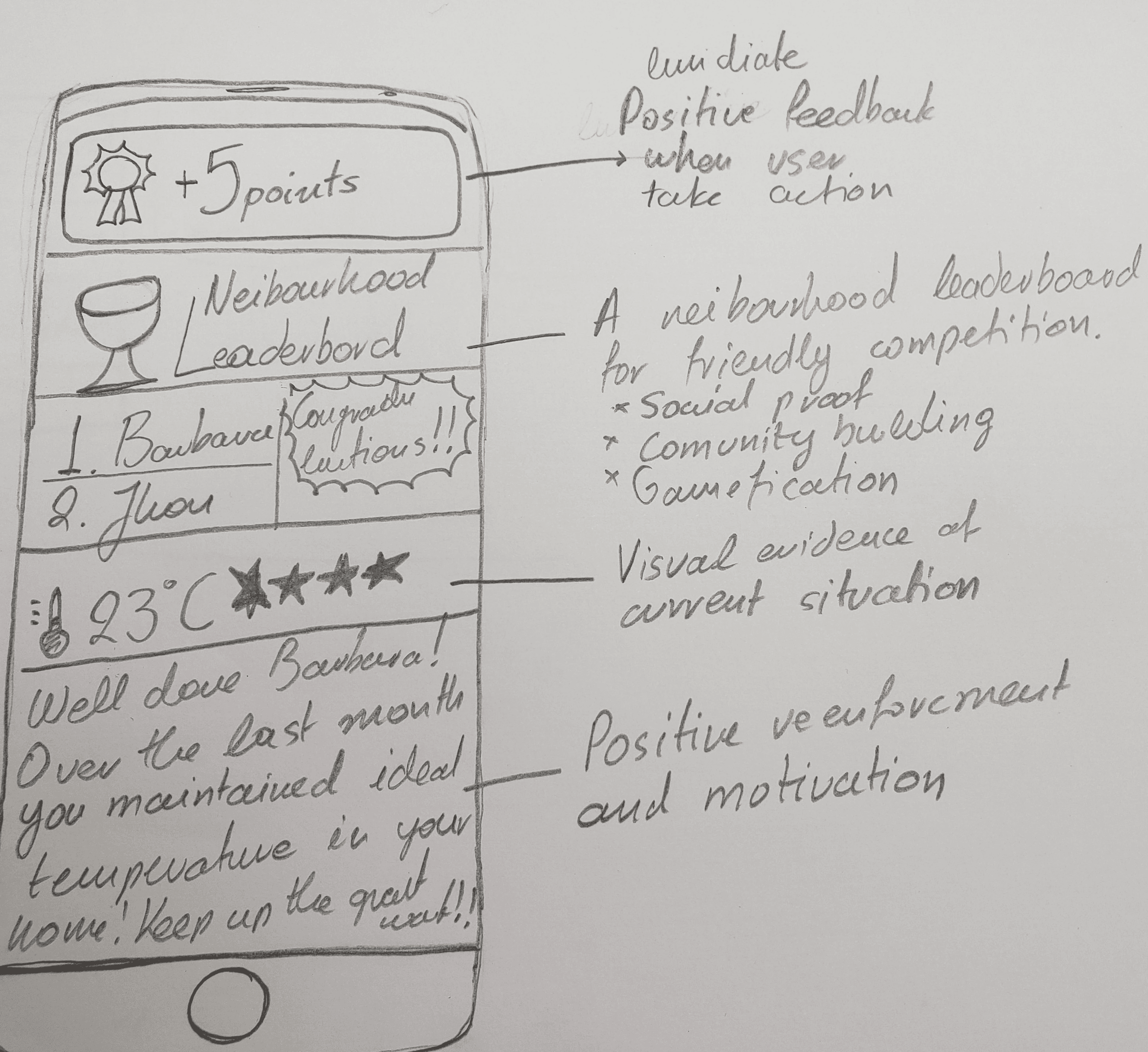
Gamification Option
Fun and engaging application to motivate change, through positive feedback and reward system.
Encourage community building with Neibourhoud leaderboards.
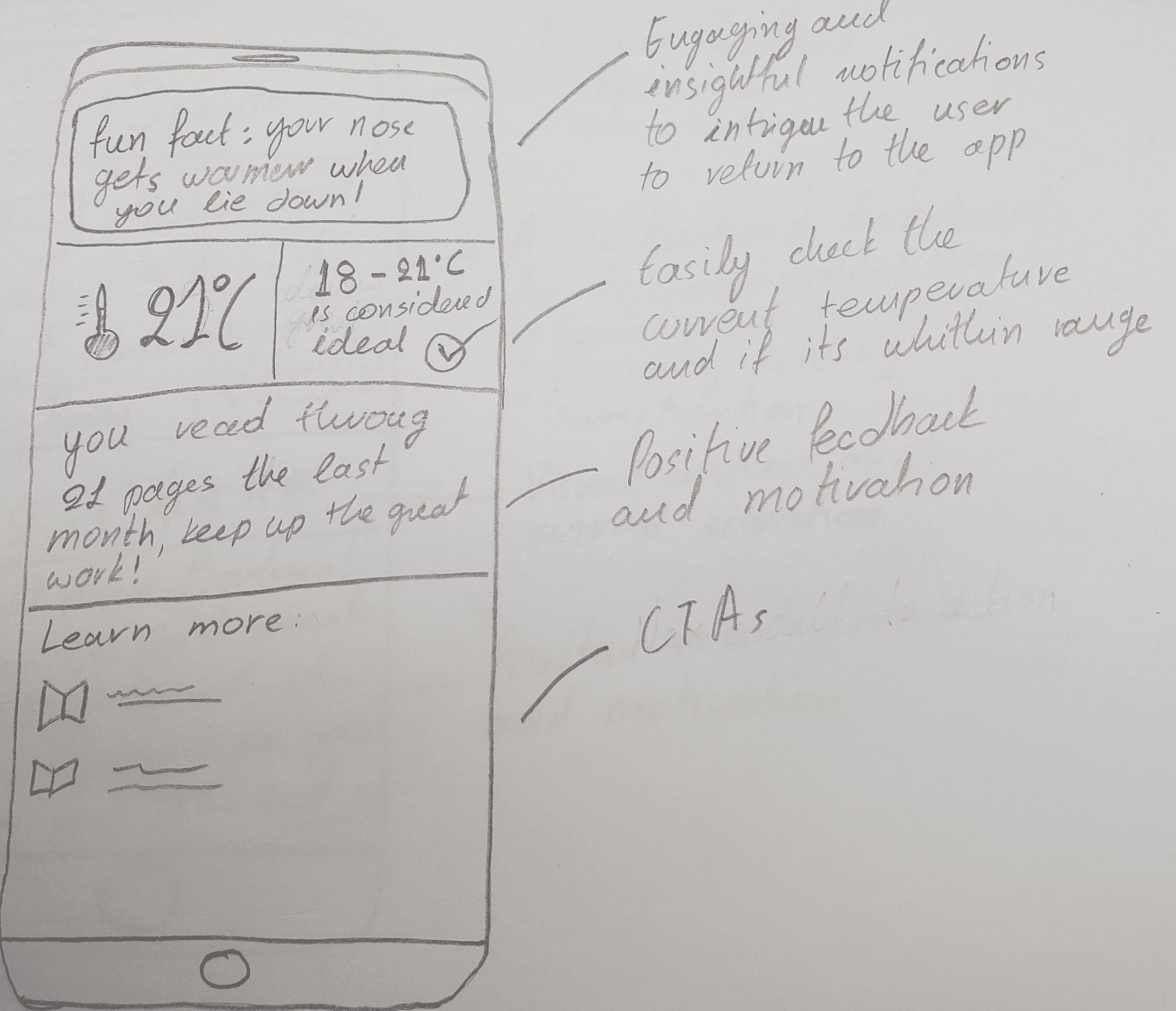
Education-Focused Option
Use of 'Spark Effect', through relevant and engaging daily fun fact notifications, to motivate users in reengaging with the application.
Clear indication of the current temperature and how it compares to the ideal range
Clean and minimal design that allows the user to focus on reading more information
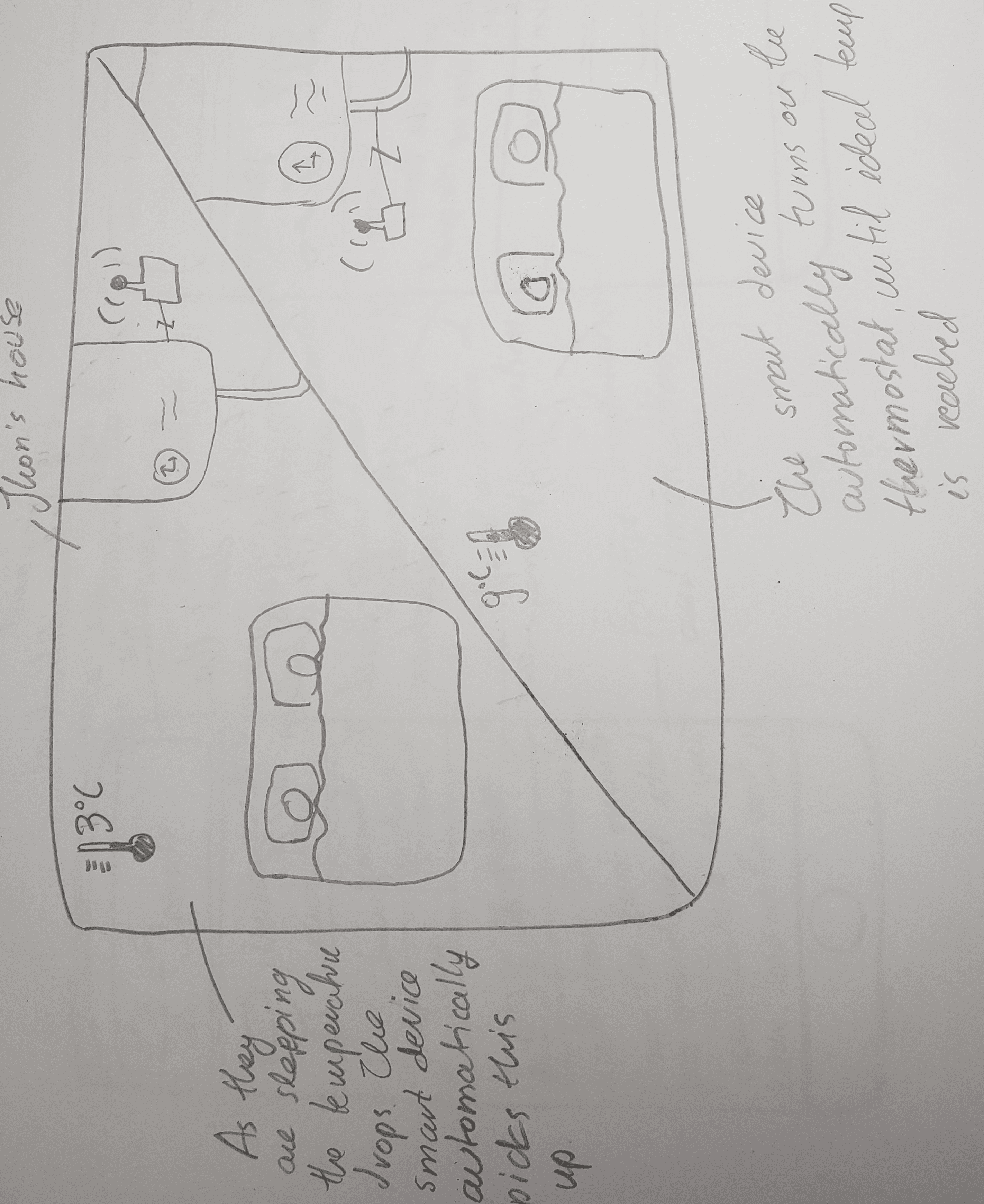
Fully-Automated Option
Use of a smart device to automatically read the temperature and readjust as necessary
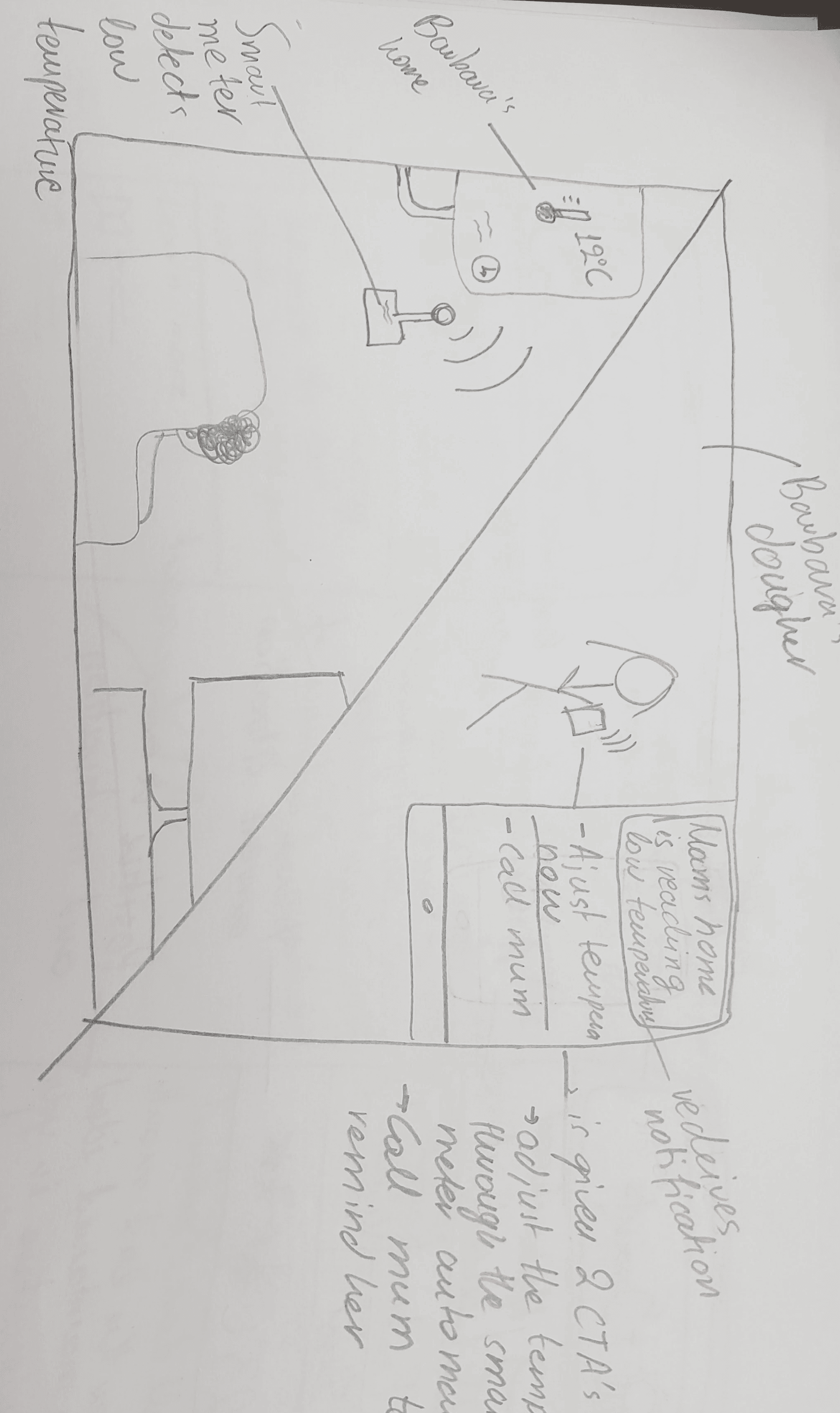
Support-Group-Oriented Option
Use of a smart device to automatically read the temperature and send notifications to a family member/carer or friend
They then have the option to automatically change the temperature remotely or to call the user
Prototype.
Prototype.


Home-Away State
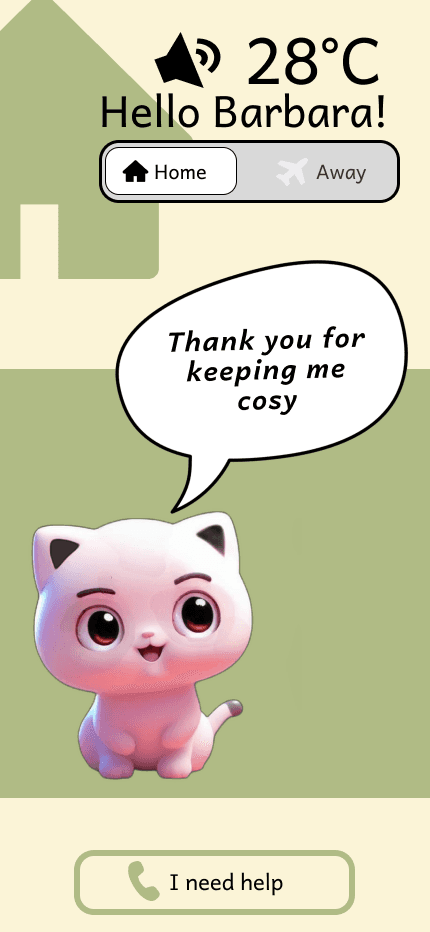



Temperature Outside Range State
Usability Study -Outline
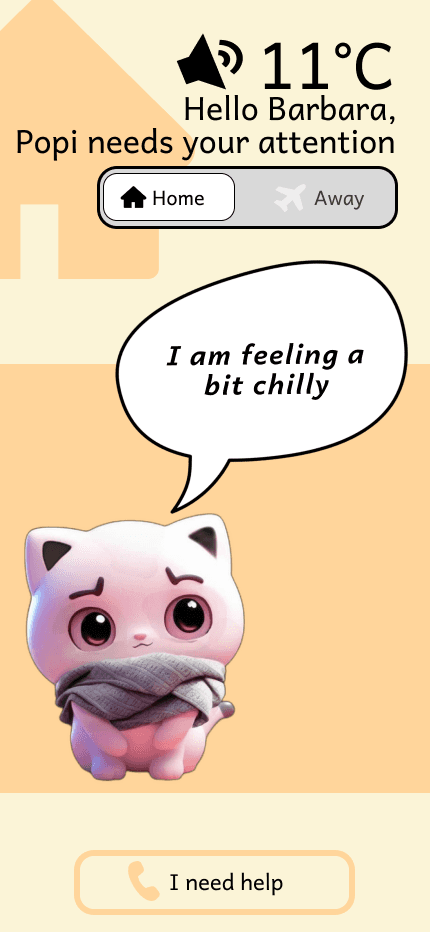



Note:
The design aims to assist in building up habits around hause heating, encouraging and reminding users.
Local councils should use the application along with initiatives to cover some of the heating bills for the most vulnerable senior citizens.
Test.
Test.
Usability Study -Outline
Introduction
Title: Creating Popi, a simple home assistant app
Author: Sofia Kyriazidi, Product designer, hello@sofiak.tech
Stakeholders: Council founding the project, other team members
Date: 29/12/2023
Project background: We are creating this app to assist the elderly in maintaining their house warm, to reduce hypothermia-related incidents. Often elderly, living alone don’t prioritize home heating, or they may forget about it.
Research goals: Figure out if the use of a virtual pet can incentivize users to take action.
Title: Creating Popi, a simple home assistant app
Author: Sofia Kyriazidi, Product designer, hello@sofiak.tech
Stakeholders: Council founding the project, other team members
Date: 29/12/2023
Project background: We are creating this app to assist the elderly in maintaining their house warm, to reduce hypothermia-related incidents. Often elderly, living alone don’t prioritize home heating, or they may forget about it.
Research goals: Figure out if the use of a virtual pet can incentivize users to take action.
Research
questions
Do users find Popi engaging? How many times do they want to check in and interact per day?
Are the different states of Popi, clear to the user? How long does it take for them to understand if their house is in good condition or not?
Do users find that they want to keep Popi warm? Do they keep the house warmer than without the use of the app?
Key Performance
Indicators
(KPIs)
Time on task
Conversion rates (action taken as a result of using the app)
SUS
Time on task
Conversion rates (action taken as a result of using the app)
SUS
Methodology
Unmoderated usability study, with on-call support
Location: United Kingdom, remote (participants will be given a smart meter and a device with the application pre-configured. They will go through the usability study in their own homes).
Date: participants’ given devices will be monitored for a week (05/02/2024 – 11/02/2024). Ideally, users will receive their devices a week in advance, so as to capture temperature data, prior to using the application and determine a working baseline.
The participants will interact with the device as they wish. We will receive a log of their activities and their answers to the SUS survey at the end of the week.
Participants
Elderly (65+), 5 participants.
At least one of them lives alone.
At least one lives with their spouse.
At least two are most vulnerable to hypothermia (as defined per NHS).
At least two have accessibility needs (visual/hearing impairment).
Choose participants from England, Scotland, Wales, and the Northern Islands.
Include participants from all sexes.
The participants will be given an incentive for participation (e.g. paycheck).
Script
Intro:
Ask for consent for recording device activity and temperature.
Let them know that any questions are welcome through the support function
Explain how this data is being collected to help create an app that can improve the lives of UK senior citizens. Your answers will help us make the app easier for people to use.
Explain that they are free to use the application as they wish. This is not a test and if they are struggling, that indicates a design problem. Make it clear it's not their fault.
SUS:
participants are asked to score the following 10 items with one of five responses that range from Strongly Agree to Strongly Disagree:
I would like to use this app frequently.
I can quickly understand if the house is in good temperature.
Home and Away functionality is clear to me.
I need the support of a technical person to be able to use the app.
I found the voice-over feature useful.
I felt confident using the app.
I needed to learn a lot of things before I could get going with this app.
I felt the language used was friendly and approachable.
The text was readable.
I could clearly understand Popi’s expressions.
Final notes:
How do you feel about the Popi app overall? What did you like and dislike about it?
Did enjoy seeing Popi daily? Were you motivated to keep your house warm?
Intro:
Ask for consent for recording device activity and temperature.
Let them know that any questions are welcome through the support function
Explain how this data is being collected to help create an app that can improve the lives of UK senior citizens. Your answers will help us make the app easier for people to use.
Explain that they are free to use the application as they wish. This is not a test and if they are struggling, that indicates a design problem. Make it clear it's not their fault.
SUS:
participants are asked to score the following 10 items with one of five responses that range from Strongly Agree to Strongly Disagree:
I would like to use this app frequently.
I can quickly understand if the house is in good temperature.
Home and Away functionality is clear to me.
I need the support of a technical person to be able to use the app.
I found the voice-over feature useful.
I felt confident using the app.
I needed to learn a lot of things before I could get going with this app.
I felt the language used was friendly and approachable.
The text was readable.
I could clearly understand Popi’s expressions.
Final notes:
How do you feel about the Popi app overall? What did you like and dislike about it?
Did enjoy seeing Popi daily? Were you motivated to keep your house warm?
Further Reflections
Further Reflections
Creation of the Popi avatar: during the prototype phase I used AI to save time (and have some fun). However, since it's a critical part of the application. During Launch I would recommend more research and time dedicated around this. Different options should be explored and tested on user groups to figure out what avatar they connect with the most.
More features could be added to improve the application further. We could mix and match some of the ideas previously explored. For example, educational content could be helpful. We could also include the feature of notifying support groups if the temperature falls below ideal for an extended period.
Since this was a practice project conducted by a single person, with limited resources, there is a high chance of bias influencing the design. For example, there is implicit bias in thinking that the elderly may struggle with technology. More research, from a neutral perspective, should be conducted. Usability tests and user observations would help us understand how our users interact with the design and how can we improve their experience.
Creation of the Popi avatar: during the prototype phase I used AI to save time (and have some fun). However, since it's a critical part of the application, during Launch I would recommend more research and time dedicated around this. Different options should be explored and tested on user groups, to figure out what avatar they connect with the most
More features could be added to improve the application further. We could mix and match some of the ideas previously explored. For example, educational content could be helpful. We could also include the feature of notifying support groups if the temperature falls below ideal for an extended period.
Since this was a practice project conducted by a single person, with limited resources, there is a high chance of bias influencing the design. For example, there is implicit bias in thinking that the elderly may struggle with technology. More research, from a neutral perspective, should be conducted. Usability tests and user observations would help us understand how our users interact with the design and how can we improve their experience.


hello@sofiak.tech






sofiakyriazidi
POPI
Better living, with a virtual friend.
Empathise.
Secondary Research
Secondary Research

‘Roughly 9,000 people die in cold homes in England and Wales every year, in similar circumstances to Mrs Bolton. That’s 24 people on average every day.’
‘Roughly 9,000 people die in cold homes in England and Wales every year, in similar circumstances to Mrs Bolton. That’s 24 people on average every day.’
User Interviews
User Interviews
Understand their daily habits around house heating.
How will the app smoothly integrate with their routine, We need to respect their habits, make the use of the App natural.
Understand their daily habits around house heating.
How will the app smoothly integrate with their routine, We need to respect their habits and make the use of the App feel natural.
QUESTIONS
Understand what motivates change.
For the app to successfully break bad habits we have to make use of appropriate incentives
Understand what motivates change.
For the app to successfully break bad habits we make use of appropriate intensives
QUESTIONS
Gain insight into the level of awareness/education they possess.
Apart from feelings and habits (explored above), humans make choices based on the knowledge they possess. Maybe there is a lack of education that we need to address for the app to be successful.
Gain insight into the level of awareness/education they possess.
Apart from feelings and habits (explored above), humans make choices based on the knowledge they possess. Maybe there is a lack of education that we need to address for the app to be successful.
QUESTIONS
Empathy map




WIP
WIP
Define.
Problem Statements
Problem Statements
Barbara is an older person who struggles to maintain optimum house temperature. She doesn't have anyone visiting her often; prompting her to up the temperature. As a result, she is used to living at a lower-than-ideal temperature. She needs a device that can effectively prompt her to act when the house reaches dangerous temperatures because her health is at risk.
Barbara is an older person who struggles to maintain optimum house temperature. She doesn't have anyone visiting her often; prompting her to up the temperature. As a result, she is used to living at a lower-than-ideal temperature. She needs a device that can effectively prompt her to act when the house reaches dangerous temperatures, because her health is at risk.
Jhon is an older person, living with his wife in a remote village in Wales. John often forgets to set the thermostat before sleep. His wife has been complaining that she feels ill during the winter. He also noticed that he wakes up feeling cold occasionally. They need a device that can remind them to turn the heat on when needed, based on the forecasted weather. This is important as they are at risk of hypothermia.
Jhon is an older person, living with his wife in a remote village in Wales. John often forgets to set the thermostat before sleep. His wife has been complaining that she feels ill during the winter. He also noticed that he wakes up feeling cold occasionally. They need a device that can remind them to turn the heat on when needed, based on the forecasted weather. This is important as they are at risk of hypothermia.
Goal Statement
Goal Statement
Our accessible home care app will ensure users maintain healthy home temperatures over the winter, by tracking house temperature and using technology to motivate or automate action when temperature is outside the ideal range. We will measure its effectiveness, by comparing the temperature readings to the ideal ranges.
Our accessible home care app will ensure users maintain healthy home temperatures over the winter, by tracking house temperature and using technology to motivate or automate action when temperature is outside the ideal range. We will measure its effectiveness, by comparing the temperature readings to the ideal ranges.
Ideate.
How might we?
How might we?
Ensure their home is always at the right temperature, without requiring their attention.
Make it so that families or carers can better help the elderly, through the application
Make keeping the house warm feel like a game or another engaging activity
Educate them in making the right choices, so that they understand the importance of keeping the house warm for their health
Ensure their home is always at the right temperature, without requiring their attention.
Make it so that families or carers can better help the elderly, through the application
Make keeping the house warm feel like a game or another engaging activity
Educate them in making the right choices, so that they understand the importance of keeping the house warm for their health
Sketching


Gamification Option
Fun and engaging application to motivate change, through positive feedback and reward system.
Encourage community building with Neibourhoud leaderboards.
Gamification Option
Fun and engaging application to motivate change, through positive feedback and reward system.
Encourage community building with Neibourhoud leaderboards.


Education-Focused Option
Use of 'Spark Effect', through relevant and engaging daily fun fact notifications, to motivate users in reengaging with the application.
Clear indication of the current temperature and how it compares to the ideal range
Clean and minimal design that allows the user to focus on reading more information
Education-Focused Option
Use of 'Spark Effect', through relevant and engaging daily fun fact notifications, to motivate users in reengaging with the application.
Clear indication of the current temperature and how it compares to the ideal range
Clean and minimal design that allows the user to focus on reading more information


Fully-Automated Option
Use of a smart device to automatically read the temperature and readjust as necessary
Fully-Automated Option
Use of a smart device to automatically read the temperature and readjust as necessary


Support-Group-Oriented Option
Use of a smart device to automatically read the temperature and send notifications to a family member/carer or friend
They then have the option to automatically change the temperature remotely or to call the user
Support-Group-Oriented Option
Use of a smart device to automatically read the temperature and send notifications to a family member/carer or friend
They then have the option to automatically change the temperature remotely or to call the user
Prototype.
Home-Away State
Home-Away State


Temperature Outside Range State


Temperature Outside Range State




Further Reflections




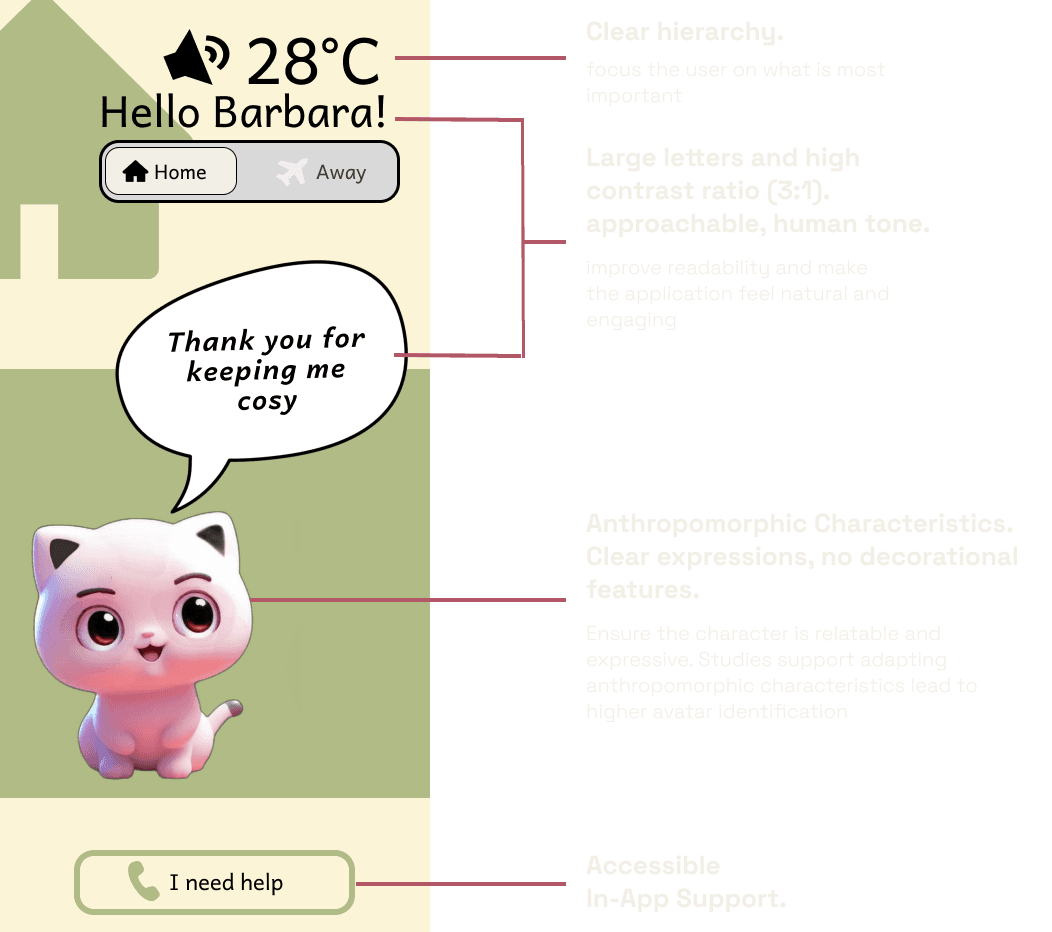



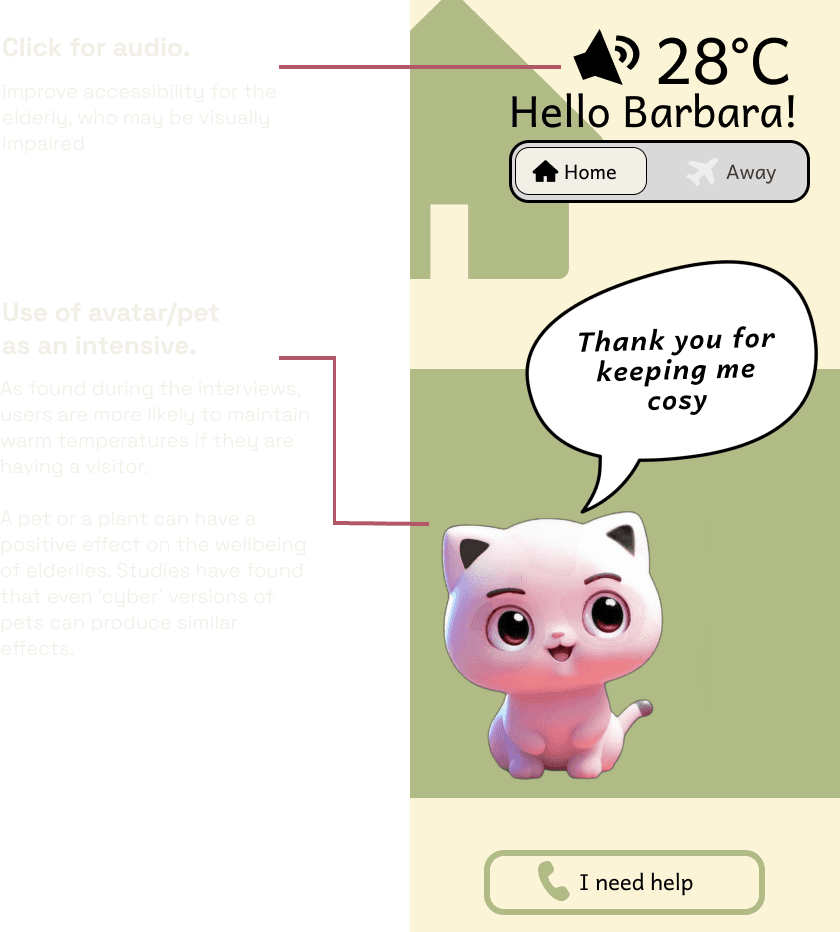

Ruth, 93 years old widowed, living in Cardiff, by herself. She recently had a hip replacement surgery.
Tim and Kelly, a couple on their 60s, living in Somerset.
Note:
The design aims to assist in building up habits around hause heating, encouraging and reminding users.
Local councils should use the application along with initiatives to cover some of the heating bills for the most vulnerable senior citizens.
hello@sofiak.tech






sofiakyriazidi
Test.
Usability Study -Outline
Script
Intro:
Ask for consent for recording device activity and temperature.
Let them know that any questions are welcome through the support function
Explain how this data is being collected to help create an app that can improve the lives of UK senior citizens. Your answers will help us make the app easier for people to use.
Explain that they are free to use the application as they wish. This is not a test and if they are struggling, that indicates a design problem. Make it clear it's not their fault.
SUS:
participants are asked to score the following 10 items with one of five responses that range from Strongly Agree to Strongly Disagree:
I would like to use this app frequently.
I can quickly understand if the house is in good temperature.
Home and Away functionality is clear to me.
I need the support of a technical person to be able to use the app.
I found the voice-over feature useful.
I felt confident using the app.
I needed to learn a lot of things before I could get going with this app.
I felt the language used was friendly and approachable.
The text was readable.
I could clearly understand Popi’s expressions.
Final notes:
How do you feel about the Popi app overall? What did you like and dislike about it?
Did enjoy seeing Popi daily? Were you motivated to keep your house warm?
Participants
Elderly (65+), 5 participants.
At least one of them lives alone.
At least one lives with their spouse.
At least two are most vulnerable to hypothermia (as defined per NHS).
At least two have accessibility needs (visual/hearing impairment).
Choose participants from England, Scotland, Wales, and the Northern Islands.
Include participants from all sexes.
The participants will be given an incentive for participation (e.g. paycheck).
Methodology
Unmoderated usability study, with on-call support
Location: United Kingdom, remote (participants will be given a smart meter and a device with the application pre-configured. They will go through the usability study in their own homes).
Date: participants’ given devices will be monitored for a week (05/02/2024 – 11/02/2024). Ideally, users will receive their devices a week in advance, so as to capture temperature data, prior to using the application and determine a working baseline.
The participants will interact with the device as they wish. We will receive a log of their activities and their answers to the SUS survey at the end of the week.
Key Performance Indicators
(KPIs)
Time on task
Conversion rates (action taken as a result of using the app)
SUS
Research questions
Do users find Popi engaging? How many times do they want to check in and interact per day?
Are the different states of Popi, clear to the user? How long does it take for them to understand if their house is in good condition or not?
Do users find that they want to keep Popi warm? Do they keep the house warmer than without the use of the app?
Introduction
Title: Creating Popi, a simple home assistant app
Author: Sofia Kyriazidi, Product designer, hello@sofiak.tech
Stakeholders: Council founding the project, other team members
Date: 29/12/2023
Project background: We are creating this app to assist the elderly in maintaining their house warm, to reduce hypothermia-related incidents. Often elderly, living alone don’t prioritise home heating, or they may forget about it.
Research goals: Figure out if the use of a virtual pet can incentive users to take action.
Further Reflections
Creation of the Popi avatar: during the prototype phase I used AI to save time (and have some fun). However, since it's a critical part of the application, during Launch I would recommend more research and time dedicated around this. Different options should be explored and tested on user groups, to figure out what avatar they connect with the most
More features could be added to improve the application further. We could mix and match some of the ideas previously explored. For example, educational content could be helpful. We could also include the feature of notifying support groups if the temperature falls below ideal for an extended period.
Since this was a practice project conducted by a single person, with limited resources, there is a high chance of bias influencing the design. For example, there is implicit bias in thinking that the elderly may struggle with technology. More research, from a neutral perspective, should be conducted. Usability tests and user observations would help us understand how our users interact with the design and how can we improve their experience.

hello@sofiak.tech



sofiakyriazidi